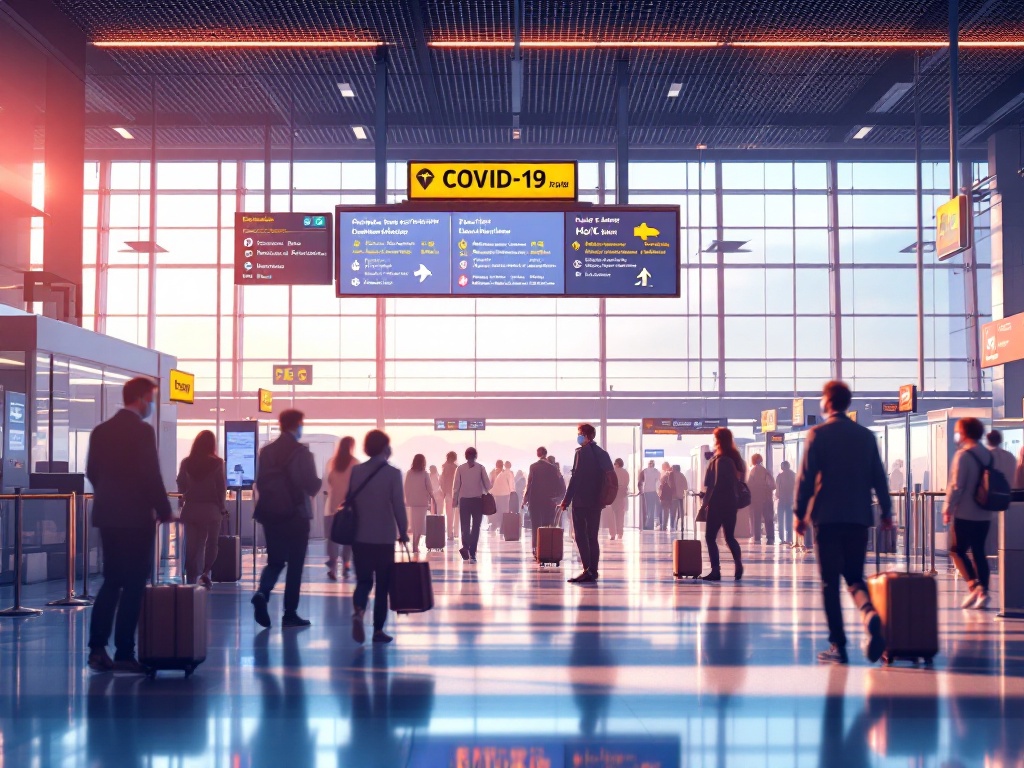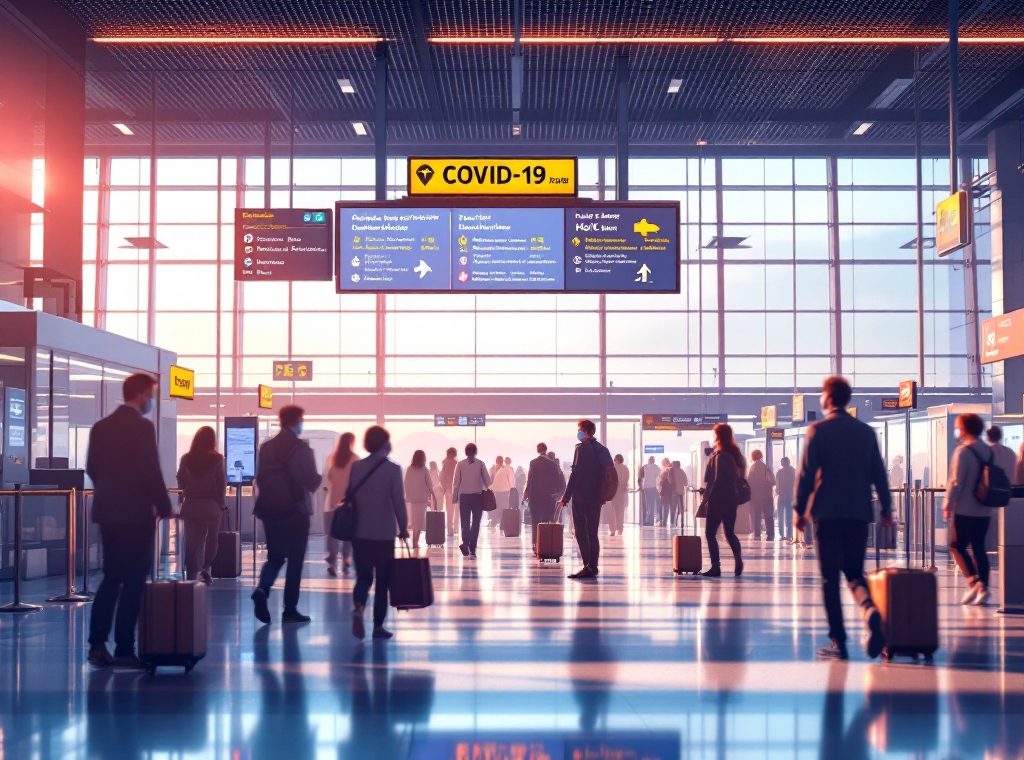Coronavirus Travel Updates: What You Must Know
Planning international travel? COVID-19 has changed everything. Travel bans, restrictions, and health advisories are constantly evolving. This guide provides essential information on navigating the complexities of international travel during the pandemic, including airline changes, country-specific restrictions, and crucial health recommendations. Learn how to stay safe and informed, from understanding the US State Department’s advisories to enrolling in the Smart Traveler Enrollment Program (STEP). Prepare for a smooth and safe journey by reading this now.
Important information

- The U.S. State Department advises against all international travel due to the ongoing pandemic.
- Travel restrictions and requirements, including bans, testing, and quarantine, vary by country and change frequently. Check official sources before traveling.
- Enroll in the Smart Traveler Enrollment Program (STEP) to receive safety updates and assistance from the nearest U.S. Embassy or Consulate.
- Practice health safety measures: maintain distance, wear a mask in crowded areas, and practice good hand hygiene.
- Americans abroad are urged to return to the U.S. immediately, and non-essential travel is discouraged.
Global Travel Restrictions and Advisories
The coronavirus pandemic has dramatically affected global travel. Many countries implemented travel restrictions to curb the virus’s spread, including outright bans and strong advisories. For instance, the US State Department issued a Level 4: Do Not Travel advisory, recommending against all international travel. Because the situation remains fluid, travelers should consult official sources for the latest information before making any plans. Advance planning is essential.
Countries Imposing Travel Bans
Travel restrictions imposed by the U.S. affect foreign nationals who have recently been in certain countries. These countries include China, Iran, and much of Europe. This applies to anyone who has been in these locations within the last 14 days.
US State Department Global Travel Advisory
The U.S. State Department strongly advises against all international travel due to the ongoing pandemic. This global advisory highlights the significant health risks associated with traveling abroad. Consult official government resources for the most up-to-date information.
Travel Advisories and Instructions for Travelers
Before your trip, check your airline’s website for travel advisories and guidelines. You can also find helpful information and real-time updates on government and health organization websites. International travel may have additional requirements, such as pre-departure testing, proof of vaccination, or quarantine upon arrival.
Travel Health Notices and Safety Guidelines
Stay healthy while traveling. Avoid close contact with anyone who appears sick. Wash your hands often with soap and water, or use an alcohol-based hand sanitizer. Consider wearing a mask in crowded areas and on public transport. Maintain physical distance, especially indoors. Follow all regulations at your destination, including capacity limits and other protocols. Stay informed about local health advisories and be ready to adjust your plans. Practice good hand hygiene and avoid large gatherings. Consider travel insurance that covers COVID-19 related issues. Research your destination’s requirements, especially for international trips, which may include pre-departure testing, proof of vaccination, or quarantine upon arrival.
Health Recommendations for Travelers
Consult local health guidelines and the US State Department’s travel advisories.
Prioritize good hygiene practices by frequently washing and sanitizing your hands.
In crowded areas, wearing a mask can help protect you and others.
Maintain a safe distance from people whenever possible and avoid large gatherings.
If you’re feeling unwell, postpone your trip.
Should you experience COVID-19 symptoms while traveling, seek immediate medical attention.
International travel may require a COVID-19 test, vaccination proof, or quarantine upon arrival, so be sure to check the specific regulations for your destination.
Discuss recommended vaccinations and health precautions with your doctor.
Vaccination Requirements and Infectious Disease Risks
International travel regulations are complex and constantly changing. Some countries require COVID-19 vaccination for unrestricted entry, while others accept a negative test result. Some countries may also provide exemptions for individuals unable to be vaccinated. Beyond COVID-19, the World Health Organization (WHO) monitors yellow fever risk and mandates vaccination for travel to affected regions, such as parts of Africa and South America. Always research your destination’s specific requirements before traveling to ensure a smooth trip.
Quarantine and Entry Requirements by Country
International travel requirements are constantly evolving. Before any trip, consult official government sources for the latest information. Many countries have specific entry rules, such as proof of vaccination or a negative COVID-19 test. Some may even impose quarantine upon arrival, while others have implemented travel bans affecting certain nationalities or regions. Because these regulations can change rapidly depending on infection rates and government policies, checking your destination’s specific rules is crucial. Being prepared is key to smooth travels. Always verify the latest travel advisories and restrictions to ensure a hassle-free journey.
High-Risk Countries and Enhanced Screening Measures
Returning US citizens and legal residents from high-risk countries will now face stricter screening measures. These enhanced protocols include detailed health questionnaires, temperature checks, and possible additional testing. These precautions are in place to safeguard public health.
Airlines and the Impact of Travel Bans
The pandemic’s travel restrictions and decreased demand forced airlines to adapt. Flights were canceled, and routes were adjusted. But this also spurred improved sanitation. Planes and airports are cleaner than ever. Furthermore, airlines now promote healthy habits like frequent handwashing and mask-wearing to ensure everyone’s safety.
Flight Cancellations and Operational Changes
Airline operations are being significantly affected by travel advisories and restrictions, leading to flight cancellations and route changes. Check with your airline for the latest information.
Airline Sanitation Efforts and Traveler Hygiene
Airlines have enhanced their cleaning procedures to combat the spread of viruses.
Travelers can also contribute by frequently washing their hands and using sanitizer.
Masks are recommended, particularly in crowded areas like airports and on planes.
Adhering to airline regulations and local health guidelines is essential.
Maintaining distance from others whenever possible is crucial to minimize risk.
Travel Tips and Resources for Safe Travel
Planning a trip abroad? Enroll in the Smart Traveler Enrollment Program (STEP). This free service allows U.S. citizens and nationals to register their travel with the nearest U.S. Embassy or Consulate. By registering, you’ll receive crucial safety updates and information regarding your destination. This includes important alerts and can be invaluable during emergencies. While STEP provides an extra layer of security, remember to travel smart.
Stay Safe Abroad
- Avoid non-essential trips,
- follow health guidelines such as mask-wearing and social distancing,
- practice good hand hygiene.
Stay Informed
- Stay informed about local health regulations,
- consider purchasing travel insurance that covers COVID-19 related issues.
Purchasing travel insurance is a wise decision for any international traveler.
Smart Traveler Enrollment Program (STEP)
Planning a trip or residing overseas? Enroll in the Smart Traveler Enrollment Program (STEP), a free service provided by the U.S. Department of State. STEP allows U.S. citizens and nationals to register their travel plans with the nearest U.S. Embassy or Consulate. This registration enables you to receive crucial safety updates about your destination country and makes it easier for the government to contact you during emergencies. Stay informed and safe abroad – enroll in STEP today.
Emergency Measures and Nonessential Travel
Americans abroad are urged to return to the US immediately. If you choose to remain overseas, be prepared for an indefinite stay. Travel restrictions may arise unexpectedly, so don’t delay. The State Department also advises against any non-essential travel given the rapidly evolving global situation.

















